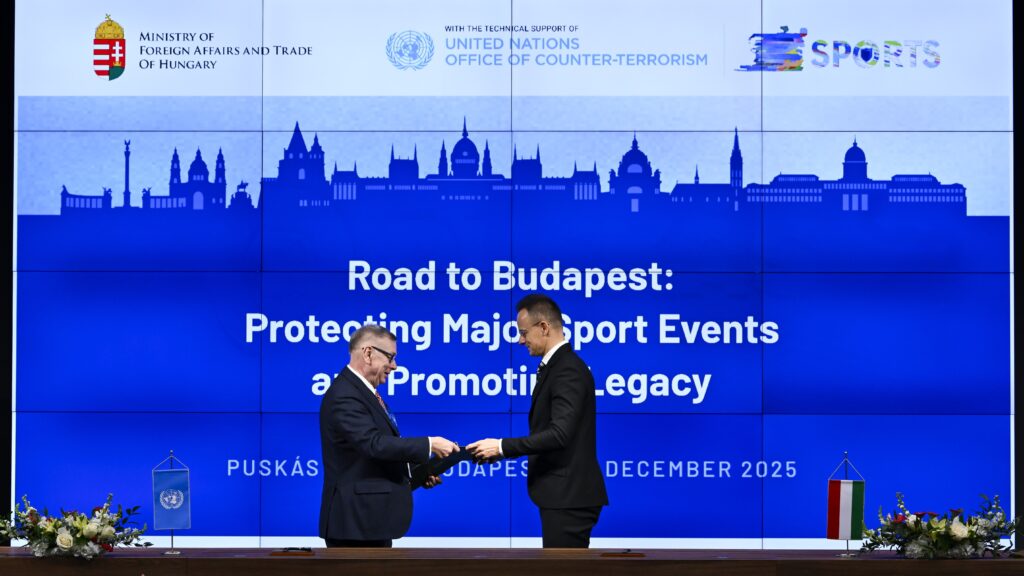We all have a duty: to our conscience, values, loved ones and ourselves. But I would argue that our most important obligation is to be a bridge between those who came before us, and those who have just arrived into this world. Protecting our youth is not only the responsibility of parents or immediate family and friends of a child but every adult who comes into contact with the most vulnerable members of our society.
This manifests in several ways, but the one I wish to shed light upon is the cooperation between people who work in child protective services and other stakeholders, to modernize the governmental bodies and NGOs that help achieve this human duty to protect the next generation and try to act as a shield against abuse. As we can read in Psalm 82:3-4 of the Bible: ‘Give justice to the weak and the fatherless; maintain the right of the afflicted and the destitute. Rescue the weak and the needy; deliver them from the hand of the wicked.’
As more and more countries recognize the vital nature of child protection—in addition to their duty to care for their citizens, it is also a long-term investment for countries to bring up productive members of society—, new pieces of legislation are being enacted.
An example of this trend is Hungary, which is evaluated as a high-ranking country with regards to providing rights comprised in The UN Convention on the Rights of the Child. However, the country has recently implemented several changes in its legal framework, all with the intention of strengthening child protective measures even further.
The Fundamental Law of Hungary, in Article XV, stipulates that ‘Hungary shall protect families, children, women, the elderly and those living with disabilities.’ This purpose is further expanded upon in Article XVI by stating that ‘Every child shall have the right to the protection and care necessary for his or her proper physical, mental and moral development.’ Recently, another legal provision was added to these obligations and checks in the constitution: Amendment 13 to the Fundamental Law of Hungary has been adopted, which means that now there is no presidential pardon for perpetrators of crimes against children.
‘In accordance with these aims, the Criminal Code now stipulates that sexual crimes against people under 18 shall never lapse’
However, this constitutional amendment is not the only change that took place. The amendments to Hungary’s Act XXXI of 1997 on the Protection of Children and the Administration of Guardianship, Act XI of 1991 on National Public Health and Medical Officer Service, and several other Acts on smaller issues related to children’s rights were adopted with 163 votes and 14 abstentions. The submitted proposal of the bill initially was supposed to provide an exception for clergymen obtaining information through confession, who would have not been obliged to report offences against children to child protective services because of their duty of confidentiality. However, this regulation never made it to the final version of amendments, as the proposer’s goal was to strengthen child protection in all aspects, leaving no room for offences to be left unpunished.
In accordance with these aims, the Criminal Code now stipulates that sexual crimes against people under 18 shall never lapse. To make the legal consequences of these heinous crimes even more severe, people convicted of imprisonment for such crimes shall not be released on probation. Perpetrators of these crimes will not be able to obtain parole, reintegration custody, or a certificate of good conduct. Moreover, Hungarian citizens who commit these offences abroad will also be included in a public database, ensuring comprehensive accountability regardless of where the crime occurs.
There would also be restrictions on who can organize camps for children: for example, those who have received community service or a fine for a deliberate offence would not be allowed to provide such a service for three years after they have been exempted from legal disqualifications.
The amendments also stipulate that leaders and staff of child protection institutions shall be screened for psychological aptitude. Candidates failing to pass the psychology test cannot be employed or should be dismissed without delay. An assessment of a worker’s ‘impeccable lifestyle’ could also be requested any time during their employment ‘once there is sufficient reason to assume that it is objectionable’, which assessment will be carried out by the police’s National Protection Service. As a standard, the impeccable conduct of staff would be checked no more than once a year. But a challenge arises out of this provision: what does it mean to have an impeccable lifestyle? The proposal would require workers to fill in a form asking whether they have a certificate, a medal, a disciplinary record, an economic interest, their income, etc.
This decision—while ensuring a high level of safety—also raises possible questions about how many new foster parents and child protective service workers would enter jobs aiming to protect the youth. A Hungarian researcher uncovered some key components[1] which led to the decline of social workers’ numbers, such as the low social prestige of child welfare and child protection work, fear of making mistakes and their consequences, the possibility of institutional investigation, and fear of threats from family members of children. These drawbacks and fears, combined with stricter requirements, may keep away several qualified and good-intentioned people from this field of work, which weakens the system. Professionals working with children who neglect to report situations where a child is at risk could face up to two years in prison now, further adding to workers’ concerns. The purpose of this amendment is to make child protection services aware of abuse and weed out the bad apples among foster parents and other workers. For this purpose, in March and April of 2024, all children’s homes were subjected to out-of-hours inspections. Despite the good intentions of lawmakers with these provisions, the crack-down was felt by child protective services, NGOs and other players in this sphere. So how could we help fight the shortage of workers in this field? How can we make sure that the most motivated and best professionals stay in this line of work, ensuring a high level of protection for the next generation?
‘How can we make sure that the most motivated and best professionals stay in this line of work…?’
A possibility could be easing the excessive bureaucratic and administrative burdens that professionals have by integrating modern technologies, specifically AI-driven models into this field. This way, professionals would have more free time to focus on children and their physical, mental and emotional development. Naturally, this would require dedication and resources on the side of the government, as well as foster parents, child protective services and other professionals. Learning about and employing innovative technologies to aid in situations like this might just be the way forward: if a child is provided with access to the internet, large-language models can be used to teach them better grammar, punctuation, vocabulary and even simple mathematical equations—with the guidance and supervision of the caretakers. Additionally, AI systems can help detect crimes and moderate content, providing learning tools for children, making them more employable in the future, while also making sure they are safe online.
To sum up, I have to give praise where praise is due: a crack-down of such magnitude will inevitably yield results when it comes to the general prevention of crimes against children. While vetting workers who have access to children is a necessary step to take, I believe that using additional tools to further aid in the goal of providing better opportunities for the next generation is the step that Hungary should take in order to become the most up-to-date, comprehensive and effective nation in this aspect. The resources poured into this endeavour will bring to fruition a new economic boom, better public safety, and ultimately, bridge the distance between values, opportunities and dreams of the Hungarians of yesterday, today and tomorrow.
[1] Rácz Andrea, ‘A gyermekvédelmi rendszer szakmaképe, az érintett gyermekek és szüleik családképe egy kutatás tükrében’, Családi Jog, vol 2020, no 1589–7516, 2020.
Related articles:







